Thursday, February 8, 2024. Annette’s News Roundup.
I think the Roundup makes people feel not so alone.
To read an article excerpted in this Roundup, click on its blue title. Each “blue” article is hyperlinked so you can read the whole article.
Please feel free to share.
Invite at least one other person to subscribe today! https://buttondown.email/AnnettesNewsRoundup
___________________________________________
Joe is always busy.
Do as the President asks. Touch 👇 to watch.
Eric, thank you for inviting me into your home and sharing with me the impact student loan forgiveness has had on you and your two sons.
— Joe Biden (@JoeBiden) February 7, 2024
Watch our full conversation: https://t.co/dNmaTyIo5j pic.twitter.com/9wWsdEExYI
Today, getting a decision on an asylum claim can take 5 to 7 years.
— President Biden (@POTUS) February 7, 2024
That's too long. This bipartisan national security bill would establish a better process.
With the new policies – and the addition of 4,300 asylum officers – we could reduce that process to just six months. pic.twitter.com/yo9AWAKCV4
___________________________________________
Kamala is always busy.
My friend Mary Kay Henry has been a champion for workers her entire career, including as the transformative president of @SEIU for the past 14 years. I am proud to have fought alongside her for higher wages, better benefits, and basic dignity for all workers. Thank you, Mary Kay. https://t.co/zJZ3nay56A pic.twitter.com/DE07nB5ueZ
— Vice President Kamala Harris (@VP) February 7, 2024
Today Mary Kay Henry announced that she will be stepping down from her role as SEIU president. She has been a clear-eyed leader with an understanding that we must build a world that values and respects all working people. From the launch of the Fight for $15 to creating new paths…
— SEIU (@SEIU) February 6, 2024

Mary Kay Henry, Visionary SEIU Leader Who Championed Fight for $15 Movement, Challenged Status Quo, Will Not Seek Re-election - SEIU - Service Employees International Union
SEIU President Mary Kay Henry to Pass Torch

___________________________________________
Protecting the vote.
Authorities target two Texas firms in probe of AI-generated Robocalls before New Hampshire Primary.
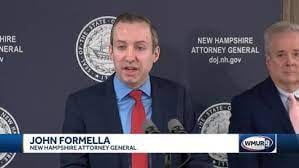
CONCORD, N.H. (AP) — Authorities issued cease-and-desist orders Tuesday against two Texas companies they believe were connected to robocalls that used artificial intelligence to mimic President Joe Biden’s voice and discourage people from voting in New Hampshire’s first-in-the-nation primary last month.
New Hampshire Attorney General John Formella said investigators have identified the source of the calls as Life Corporation and said they were transmitted by a company called Lingo Telecom. New Hampshire issued cease-and-desist orders and subpoenas to both companies, while the Federal Communications Commission issued a cease-and-desist letter to the telecommunications company, Formella said. In a statement, the FCC said it was trying to stop “behavior that violates voter suppression laws.”
During a news conference to discuss the investigation, Formella described the calls as the clearest and possibly first known attempt to use AI to interfere with an election in the U.S. He noted that the calls went well beyond the political fliers that have landed in voters’ mailboxes during past elections.
“Calls using AI with something as deceptive as trying to clone the voice of the president of the United States, we haven’t seen something like that before so close to an election with such a blatant attempt to mislead voters,” Formella said. “We don’t want it to be the first of many. We want this to be an example for us to point to, but also an enforcement example for anyone out there who would consider doing this.”
A message left for Life Corporation’s owner, Walter Monk, at his company Wholesale Communication was not immediately returned. Alex Valencia, who was named in an FCC letter as the chief compliance officer at Lingo Telecom, did not immediately return an emailed request for comment. A message also was left for Lingo’s chief executive officer.
The recorded message was sent to between 5,000 and 25,000 voters two days before the Jan. 23 primary. It used a voice similar to Biden’s, employed his often-used phrase, “What a bunch of malarkey” and falsely suggested that voting in the primary would preclude voters from casting a ballot in November’s general election.
Biden won the Democratic primary as a write-in candidate after he kept his name off the ballot in deference to South Carolina’s new lead-off position for the Democratic primaries.
The calls falsely showed up to recipients as coming from the personal cellphone number of Kathy Sullivan, a former state Democratic Party chair who helps run Granite for America, a super PAC that supported the Biden write-in campaign. Formella said at least 10 people who received the calls then called Sullivan.
The apparent attempt at voter suppression using rapidly advancing generative AI technology is one example of what experts warn will make 2024 a year of unprecedented election disinformation around the world.
Biden’s campaign praised the investigation into the calls.
“Disinformation aimed at suppressing voting and deliberately undermining free and fair elections is an unacceptable threat, and we commend the New Hampshire Attorney General for taking the matter seriously and moving swiftly as a powerful example against further efforts to disrupt democratic elections,” campaign manager Julie Chávez Rodriguez said.
The FCC’s cease-and-desist letter to Lingo Telecom said the investigation involved working with the Industry Traceback Group, a consortium of telecom and broadband industry service providers that can trace calls to their source, even if they have been “spoofed” to make it look like they came from someone else.
The letter said once Lingo Telecom was identified as the original provider for the calls, the company identified Life Corporation as the party who initiated them. Josh Bercu, executive director of the Industry Traceback Group, confirmed the organization was involved in the investigation and was able to trace the source of the calls within four hours. He declined to comment further on the case.
Formella said charges could be brought under New Hampshire’s voter suppression law — a felony punishable by up to seven years in prison or under two federal laws, the Truth in Caller ID Act and the Telephone Consumer Protection Act. Each also carries the potential for thousands of dollars in fines.
He said the investigation is just beginning butwanted to send a strong message to deter others who might be tempted to interfere in this year’s elections.
“Our message is clear: Law enforcement across the country is unified on a bipartisan basis and ready to work together to combat any attempt to undermine our elections,” he said. (ABC News from the Associated Press)
___________________________________________
Some commentary about the embarrassing, failed MAGA impeachment attempt.
Republican Speaker Mike Johnson named Marjorie Taylor Greene co-manager of the MAGA attempt to impeach Homeland Secretary Alejandro Mayorkas.
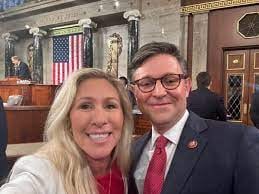
The impeachment failed and she made a complete fool of herself, accusing the Democrats of “playing a game” and hiding one of their members.
“It's not our responsibility to let House Republicans know which members will or will not be present on the House floor on any other day or in connection with any given vote,” Minority Leader Hakeem Jeffries told reporters Wednesday in the Capitol.
For those who keep count, the final vote defeated the impeachment attempt by 2 votes, not 1 - 216 to 214. Even after losing, MTG couldn’t count the vote.
This made me think about her and all the Republicans who asked Trump for pardons before he left office. The subtitle of the image below is correct - the innocent don’t have to ask for pardons.
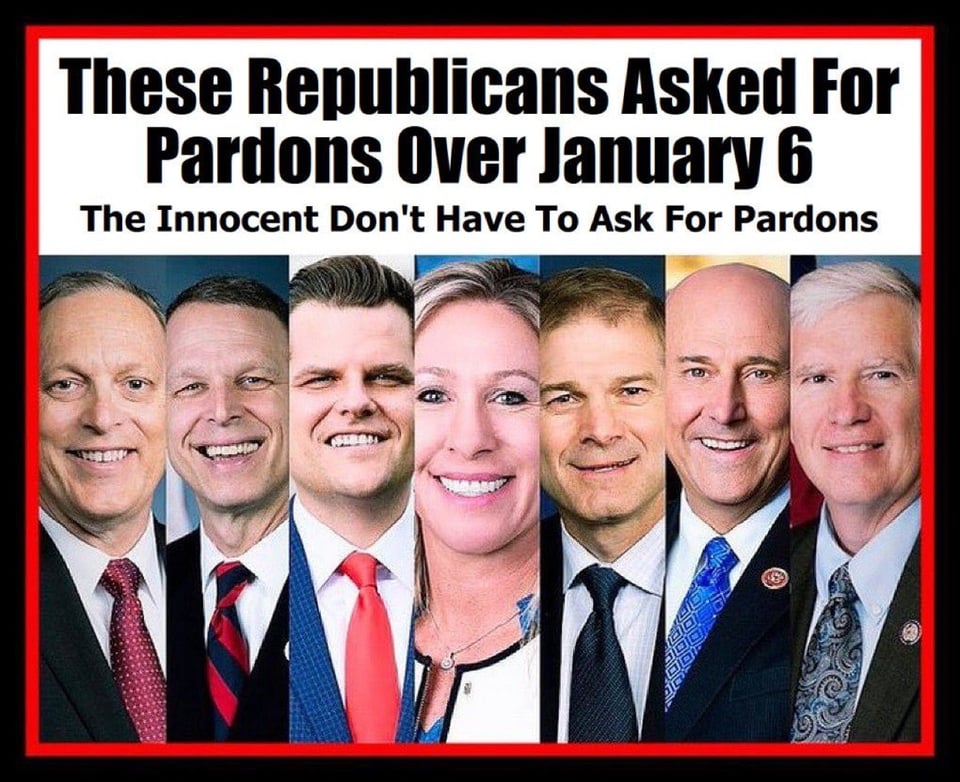
Watch the Congresswoman from Georgia describe her feelings about the “peaceful transfer of power,” which has been the basis of our continuous and lawful Republic since 1776.
Marjorie Taylor Green doesn't like people calling her an insurrectionist.
— Shawn Harris (@ShawnForGeorgia) February 7, 2024
But why didn't MTG think that this video she posted right before Jan 6, 2021, would remain on social media forever and be shared far and wide? pic.twitter.com/jKAdsIa7un
These MAGA Republicans are bad, bad as well as incompetent, people. Their goal is a Christian nationalist nation.
We need to make sure they lose not just votes on the Congressional floor, but their own elections, and failing that, be indicted for their roles on January 6th.
___________________________________________
MAGA and Putin.
Trump and the MAGA Republicans have always had an unusually close and shocking admiration for Putin.
The meeting between President Putin and myself was a great success, except in the Fake News Media!
— Donald J. Trump (@realDonaldTrump) July 18, 2018
Remember Trump’s continuing praise for the Russian Dictator. Remember the embarrassing press conference following the 2018 Trump-Putin summit in Finland where the President of the United States did not accept Russian interference was part of the 2016 U.S. elections.
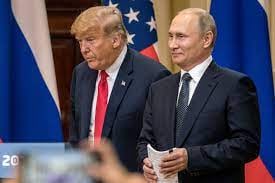
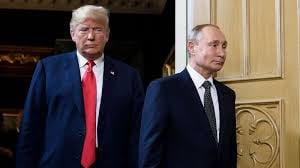
Trump's obeisance to Putin shocked the world, including some of his political allies.
Even one year later the fallout hadn’t ended. The Summit was on July 16, 2018. On July 17, 2019, former Vice President Joe Biden spoke out. Clearly already thinking about the danger Trump presented to Democracy and the world order, Biden declared President Trump’s news conference in Helsinki helped Russian President Vladimir Putin’s “agenda.”
Speaking at a town hall on democracy at the University of Los Andes in Bogotá, Colombia on Tuesday, Biden said Putin’s goal is to “break the liberal international order that was created after WWII — that have generated prosperity and peace at that time.” He said Trump is “helping with this agenda.” (Source:CNN).
Over the weekend, former Fox News Channel personality Tucker Carlson, who routinely echoed Russian talking points on his show, was spotted in Moscow. Reports say he has been there since last Thursday, staying in the city’s top hotels and visiting its main cultural sites.
Tucker Carlson said on his now-defunct show that in the conflict between Russia and Ukraine, he was “rooting for Moscow.” The Russian Union of Journalists has said they would gladly accept Carlson as a member.
Dear followers of Tucker Carlson,
— Edward Hunter Christie (@EHunterChristie) February 6, 2024
While you enjoy the show, please bear in mind there are several American journalists in Russia on a long-term basis, of which two are in prison, censored by Russia, jailed by Russia.
Because that's how that country works: if you're not careful…
Carlson is a traitor, and should be treated like one. EU officials are starting to go after him.
JUST IN: 🚨The European Union is considering imposing sanctions on Tucker Carlson, potentially including a travel ban, accusing him of acting as a propagandist for Vladimir Putin. 🚨 pic.twitter.com/iAGP7Fn8lQ
— Brian Allen (@allenanalysis) February 7, 2024
Occupy Democrats reported this -
“In a bombshell new interview, a prominent member of the European Parliament just told Newsweek that he is now calling on the European Union to impose a "travel ban" on Carlson, describing Carlson as "a mouthpiece" of former President Donald Trump and Putin.
To make matters worse for Tucker Carlson, another member put Carlson on notice that he needs to “remember that Putin is not just a president of an aggressor country, but he is wanted by the International Criminal Court and accused of genocide and war crimes.”
Adding insult to injury, another member declared, "Carlson wants to give a platform to someone accused of crimes of genocide—this is wrong. If Putin has something to say he needs to say it in front of the ICC. At the same time Carlson is not being a real journalist since he has clearly expressed his sympathy for the Russian regime and Putin and has constantly disparaged Ukraine, the victim of Russian aggression.
Yet another member declared that Tucker Carlson “is no longer a newsman, but a propagandist for the most heinous regime on European soil and the one which is most dangerous to our peace and security. So, for such propaganda for a criminal regime, you can end up on the list of sanctions.”
One more thing. Or two.
When the Republicans stopped the Border Bill, they also stopped funding for Ukraine. #RepublicanRussianTrain
This happened yesterday too.
Breakin’ news.💥 Russian planes over Alaska
The North American Aerospace Defense Command said on Tuesday that it had detected and tracked four Russian warplanes flying near Alaska. https://t.co/25BfcwAsfQ
— CBS News (@CBSNews) February 7, 2024
___________________________________________
The Supreme Court will hear this case today.
Here are 2 posts on whether or not paragraph 3 of Article 14 of the Constitution should keep Trump off the ballot in Colorado (and maybe other states).
Post #1.
A Legal Outsider, an Offbeat Theory and the Fate of the 2024 Election.
When the Supreme Court considers whether Donald J. Trump is barred from appearing on Colorado’s ballot, a professor’s scholarship, long relegated to the fringes, will take center stage.
In the world of American legal scholarship, Seth Barrett Tillman is an outsider in more ways than one. An associate professor at a university in Ireland, he has put forward unusual interpretations of the meaning of the U.S. Constitution that for years have largely gone ignored — if not outright dismissed as crackpot.
But at 60, Professor Tillman is enjoying some level of vindication. When the U.S. Supreme Court considers on Thursday whether former President Donald J. Trump is barred from Colorado’s primary ballot, a seemingly counterintuitive theory that Professor Tillman has championed for more than 15 years will take center stage and could shape the presidential election.
The Constitution uses various terms to refer to government officers or offices. The conventional view is that they all share the same meaning. But by his account, each is distinct — and that, crucially for the case before the court, the particular phrase “officer of the United States” refers only to appointed positions, not the presidency.
If a majority of the court accepts Professor Tillman’s rationale, then Mr. Trump would be allowed to appear on the ballot. At issue is the meaning of Section 3 of the 14th Amendment, adopted after the Civil War, which bars people from holding office if they participated in an insurrection after having sworn to uphold the Constitution as an officer of the United States.
Professor Tillman, heavily bearded with black-rimmed glasses and a bookish demeanor, flew to the United States this week to watch the arguments. With Josh Blackman, who teaches at South Texas College of Law Houston, Professor Tillman submitted a friend-of-the-court brief and asked to participate in arguments, but the court declined.
Still, his hobbyhorse will be on the Supreme Court’s agenda, and it has drawn as much zealous backing as it has ferocious pushback.
Mr. Trump’s legal team led with the idea in its brief to the court, and many supporters of overturning Colorado’s disqualification of Mr. Trump have invoked it — including three former Republican attorneys general, Edwin R. Meese III, Michael Mukasey and William P. Barr.
But the conservative former judge J. Michael Luttig, in a withering series of posts on X,mocked Mr. Trump and his supporters for having “put all of their eggs in Blackman’s and Tillman’s tattered basket of constitutional interpretation.”
He cited a recent Lawfare article that called attention to a letter Justice Antonin Scalia sent Professor Tillman in 2014 rejecting his theory. (Professors Tillman and Blackman published it in an article last year.)
During a video interview from his book-cluttered living room in Dublin, Professor Tillman gave a rueful chuckle and gestured toward his outsider status — and location — as he said that critics were objecting “in the most meanspirited and personal way, without any attempt to grapple with the ideas.”
“It’s very dispiriting,” he added. “But fortunately, I’m here. I’m in a position where I can walk away from such things.”
Akhil Reed Amar, a Yale Law School professor who submitted a brief siding with Colorado's top court, portrayed Professor Tillman’s theory as a “gimmick” that relied on tracing words in “all these interesting little ways that makes no sense of the thing as a whole.” He predicted it would get at most three votes on the nine-member court.
At the same time, Professor Amar described Professor Tillman as a “brilliant” person who was at last gaining mainstream recognition.
“Tillman is one of the genuinely interesting people in our world, and the world hasn’t rewarded him very much,” he said. “Think about the strength of character that is required to keep plodding away for 30 years on some of these things, when no one seems to be paying any attention to you.”
Professor Tillman declined to predict how the Supreme Court would rule but said that even one vote based on his position would lend it credence as a “serious or reasonable point of view.” But asked whether he would feel vindicated if a majority of justices were to endorse it, he struck a tone of resignation.
In one sense, yes, he said. “But in the sense of would there be any vindication in the largest element of American legal academia? I think the answer is no. I think they would still say what the largest numbers have already said, which is that the particular view I put forward is wrong and if the Supreme Court adopted it, they did it for pragmatic reasons they don’t wish to acknowledge.”
The Supreme Court could also decide the case on other grounds. It could uphold the Colorado decision. Or it could restore Mr. Trump to the ballot based on different reasoning, like saying that Mr. Trump’s actions leading up to the Jan. 6, 2021, Capitol riot fell short of insurrection, or that — as Professor Tillman also argues — Section 3 would need a statute to be enforceable.
But earlier in the case, a trial judge in Denver embraced Professor Tillman’s idea. While the judge ruled that Mr. Trump’s efforts qualified as insurrection, she kept him on the ballot because, she said, presidents are not officers of the United States. The Colorado Supreme Court later disagreed. But Professor Tillman said the fact that a lower court had embraced his position already meant it could no longer be dismissed as off the wall.
An Orthodox Jew who goes offline for the Sabbath at sundown each Friday, Professor Tillman was born in New York in 1963, the second of two children. His father was a co-owner of a factory in Yonkers and his mother a homemaker.
His parents relocated to the suburbs of Rockland County when he was 7, he said, because they were alarmed that he had witnessed a murder on a playground. He said a woman had slapped a drunk man, who chased her until a janitor intervened and choked the man to death.
After earning an undergraduate degree in economics from the University of Chicago in 1984, he worked as a commodities trader and researcher until 1997, when he enrolled in Harvard Law School. Once he graduated in 2000, he bounced around for a decade, completing four judicial clerkships and a stint at two law firms — while writing academic articles on the side.
He wanted to be a law professor but had difficulty finding a full-time position. In 2011, Maynooth University School of Law and Criminology hired him as a lecturer and he moved to Ireland with his wife, now a secretary at a Dublin synagogue, and their four children. In his spare time, he said, he enjoys stargazing and East Asian history and political philosophy. This term, he is teaching equity and trusts law.
He said he was grateful for the job, but he also sounded somewhat lonely professionally. Most of his Maynooth colleagues, he noted, focus on legal questions related to Ireland or the European Union, rather than on the American constitutional issues that preoccupy him.
Professor Tillman described himself as the perpetual odd man out. His great passion, he said, has been to show that the original meaning of words and phrases in the Constitution are rooted in parliamentary understandings that quickly disappeared after its ratification, as American thinking shifted to a separation-of-powers model that emphasized the judiciary rather than Congress. Few scholars on the left or the right, he said, are interested.
“I’m not on anybody’s speed dial back in the United States — my work is very unusual,” he said, adding, “If you try to hawk that or to sell that position in the United States, within legal academia, the opportunity of finding an audience is vanishingly small.”
Professor Tillman employs a hyperclose reading of the Constitution. He assumes that the text was written with tremendous precision and intentionality, so subtle distinctions are significant — and their meaning can be inferred by carefully tracing words through the text.
His argument that presidents are not officers of the United States traces back to his response to a 1995 law journal article by Professor Amar and his brother, Vikram D. Amar, a professor at the University of California, Davis.
A law that puts the speaker of the House and the Senate president pro tem in the line of presidential succession is unconstitutional, the Amars argued, partly because of a provision that bars “holding any office under the United States” while also being a member of Congress. In a footnote, they observed that a “quibbler” might try to insist that the presidency is not an office under the United States, even as they rejected that idea.
“The whole basis of the paper, as I understood it, was that the varying terminology in the Constitution for ‘office’ and ‘officer’ all meant the same thing,” Professor Tillman recalled. “I set out on an intellectual project of saying, ‘Well, what if the Amars are wrong? What if the different “officer” phraseology in the Constitution had different meanings?’”
In short, Professor Tillman became a quibbler. As a law clerk in 2008, for example, he asserted in a paper that the winner of the 2008 presidential election, which pitted Senator Barack Obama against Senator John McCain, could keep his Senate seat while also serving as president.
Professor Tillman made various iterations of that argument, eventually catching the eye of William Baude, a University of Chicago law professor. In a short essay in 2016, Professor Baude appeared both bemused and intrigued.
“When you read an individual Tillman piece, you will notice exceedingly technical arguments combined with an almost urgent voice,” Professor Baude wrote. “You cannot help but think the author is brilliant, and you cannot help but wonder if the author is rather eccentric. As you read more of the pieces together, you will realize that he has a constitutional project, that he pursues it with great skill and knowledge, and that if he didn’t do it, nobody would.”
That did not mean Professor Baude agreed. Last summer, he co-wrote a widely cited article arguing on originalist and textualist grounds that Mr. Trump is ineligible to be president again. The essay repudiated Professor Tillman’s view, saying that phrases like “officer of the United States” must be read “sensibly, naturally and in context, without artifice” that would render it a “‘secret code’ loaded with hidden meanings.”
Professor Tillman’s theory started to get more attention as Mr. Trump’s presidency raised novel legal issues. After Mr. Trump won the 2016 election, Professor Blackman said he recognized that a president who owned a global hotel empire would lead to legal fights over the Constitution’s foreign emoluments clause. It bars people holding “any office of profit or trust under” the United States from accepting certain payments from foreign states.
Professor Blackman approached Professor Tillman and proposed they write about the office issue. In a case challenging Mr. Trump’s acceptance of foreign government patronage at the hotel he then operated in Washington, the two scholars submitted a friend-of-the-court brief arguing that the clause does not cover the presidency.
In a 2018 ruling, a federal judge in Maryland engaged at length with Professor Tillman’s view — and rejected it. That case was eventually dismissed on other grounds. But the Colorado ballot case has now given the line of inquiry even greater salience.
“His work was frantic,” Professor Blackman said. “Now everyone is listening.” (New York Times).
Post #2.
The Supreme Court Should Get Out of the Insurrection Business.
The Supreme Court will hear arguments on Thursday about whether Colorado may keep Donald Trump off the presidential ballot because of the storming of the Capitol on Jan. 6, 2021. The justices should seek a ruling that is originalist, modest and respectful of America’s democratic federalism.
In particular, they should focus on two phrases: “the first insurrection of the 1860s” and “the fifty-state solution.”
The first phrase explains why Mr. Trump’s conduct squarely falls under Section 3 of the 14th Amendment, which bars from any “office, civil or military, under the United States” any important public servant who, after swearing an oath to the Constitution, engages in an “insurrection” or gives insurrectionists “aid or comfort.”
The second phrase highlights the Constitution’s well-established structure for presidential elections, blending democracy with federalism. A 50-state solution allows each state to use its own distinct procedures and protocols for applying Section 3.
Mr. Trump’s lawyers legitimately ask what counts as a disqualifying insurrection. Section 3, they note, was clearly aimed at oath-breakers who had backed insurrections akin to the Civil War. In that calamitous insurrection, more than half a million people died. The Jan. 6 Capitol riot, they argue, pales in comparison.
But Section 3’s authors actually had not one but two recent insurrections in mind. Before the bloody insurrection that began when cannons roared at Fort Sumter in April 1861, there was the first insurrection of the 1860s, led by cabinet members of outgoing President James Buchanan, including John B. Floyd, the war secretary, and Philip Francis Thomas, the treasury secretary, among many others. A shadowy network of affiliates and co-conspirators aimed in several and nefarious ways — including mayhem, military subversion and even murder, if need be — to prevent the lawful counting of President-elect Abraham Lincoln’s electoral votes and to thwart his lawful inauguration in early March 1861.
From one angle, the first insurrection was even worse than the giant insurrection that followed. It aimed not merely to shrink the union, but to undo a legitimate presidential election for all Americans.
On Feb. 13, 1861 — the closest equivalent of Jan. 6, 2021 — Congress met to certify Lincoln’s victory. Malicious anti-Lincoln men congregated near the Capitol. But thanks to Gen. Winfield Scott’s steely defense, the Capitol held.
In some ways, the insurrection of 2021 was worse than the first insurrection of 1861. The Capitol did not fall in 1861, but it was breached in 2021.
Section 3 squarely covers oath-breaking insurrectionist presidents seeking to regain presidential power. When Americans debated Section 3 in the mid-1860s, it was widely understood that Section 3 aimed to prevent Confederate leaders like Jefferson Davis from becoming president. No prominent participant is known to have ever said that this provision somehow exempted oath-breaking presidents. Similarly, no one claimed that Section 3 somehow overlooked other leading oath-breakers seeking the presidency. Even Mr. Trump’s own lawyers appear to concede this last point in their recent filings.
But the question remains: Who is to decide, and using what legal procedures, whether Mr. Trump himself must answer for Jan. 6?
The Constitution provides the answer. It structures a 50-state solution in which different states may properly use different procedures and protocols, and different standards of proof, to apply Section 3. Some states, like Colorado, may carefully police ballot access even in primary elections. Others will focus more on the general ballot. Still others may wait until vote tabulation begins. Yet another cluster of states may defer to Congress as the last actor when Electoral College ballots are unsealed. In past elections, Congress has at times refused to count improper electoral votes.
Under the 50-state solution, facts as found by a state trial court in Colorado permit that state to act. But other states using different procedures are free to act differently, or not at all. What happens in Denver stays in Denver, unless other states choose to follow suit. In 1860, Lincoln was not on the ballot in every state; ditto for Ralph Nader in 2000. Welcome to the Electoral College.
But what about democracy? The first-insurrection concept reminds us that those who attack elections cannot justly complain when they are disfavored in later elections. Turnabout is fair play. And the 50-state-solution notion reminds us that Americans have never picked presidents in a single undifferentiated national contest. Eight years ago, constitutional federalism made Mr. Trump president even though Hillary Clinton won millions more votes nationally. This time around, constitutional federalism may well disfavor Mr. Trump.
An originalist first-insurrection-plus-50-state approach could appeal to the court and its individual justices for several overlapping reasons.
Start with Chief Justice John Roberts. An institutionalist by both role and temperament, he most likely aspires to achieve judicial unanimity or near-unanimity in this high-profile case. This goal will be easier to reach if the justices all steer by the same north star. The obvious focal point in this case — a case squarely about constitutional oaths — is the oath itself, which each justice takes before exercising power. It is an oath to uphold the Constitution — and thus to take Section 3 seriously, come what may.
The chief justice also believes in judicial modesty. A 50-state solution creates one of the smallest splashes possible. Each state has some leeway as a laboratory of democracy, in keeping with the teaching of Justice Louis Brandeis, one of the chief justice’s heroes.
Justice Amy Coney Barrett, another believer in judicial modesty, often votes alongside the chief justice, as does Justice Brett Kavanaugh. Were these two Trump-nominated associate justices to rule against Mr. Trump himself, they would offer America and the world a dazzling lesson in judicial independence and constitutional fidelity, reversing the damage done decades ago by the partisan lineup in Bush v. Gore.
Justice Elena Kagan might well be moved by the story of the first insurrection. She herself once worked in the executive branch under President Barack Obama. When his party lost the presidency in 2016, she watched him admirably channel Gen. Winfield Scott, ensuring a peaceful transfer of power to President Trump.
Justice Sonia Sotomayor has her own strong reasons for upholding the actions of the Colorado judges. As a former trial judge, she understands viscerally the importance of allowing trial judges to make well-supported findings of fact, as did the trial judge in this case, after allowing Mr. Trump’s attorneys ample opportunity to be heard and present evidence. Proper deference to triers of fact is one of the many virtues of the 50-state solution.
The court’s newest member, Justice Ketanji Brown Jackson, has already shown flashes of brilliance in practicing her distinctive brand of liberal originalism. A strong believer in constitutional text and enactment history, she is likely to pay close attention to the story of the first insurrection.
The remaining three justices are more conservative originalists who also care deeply about the history underlying key constitutional texts. Twenty years ago, most Americans ignored the important fact that the authors of the 14th Amendment’s first section believed in gun rights, especially for Southern Black citizens. Thanks especially to Justices Samuel Alito and Clarence Thomas, the court in recent years has heeded serious historians and read Section 1 honestly and broadly. These justices should now do the same thing for Section 3.
And Justice Neil Gorsuch (who was born in Denver) need only say again what he said as an appellate judge in 2012 in a presidential-election case arising out of Colorado. “A state’s legitimate interest in protecting the integrity and practical functioning of the political process permits it to exclude from the ballot candidates who are constitutionally prohibited from assuming office.” That was the right answer in 2012, and it remains the right answer today.
The Constitution is best read to safeguard intricate federalism over pure nationalism — and the Supreme Court’s ruling should reflect that principle. (New York Times).
Tonight at SCOTUS: a full house camping out overnight for public seats in tomorrow’s historic hearing on whether Donald Trump should be disqualified from holding future office under section 3 of the 14th amendment pic.twitter.com/wJMzx7RoBN
— Steven Mazie (@stevenmazie) February 8, 2024
Will you be listening in to the oral argument at SCOTUS via MSNBC tomorrow at 10 am ET?
___________________________________________
Happy National Girls and Women in Sports Day.
Missed it? Me too, but let’s celebrate today to show we are glad such a day exists.
Happy National Girls & Women in Sports Day®!
— Billie Jean King (@BillieJeanKing) February 7, 2024
I am thrilled to join @WomensSportsFdn in this annual celebration.
Head to https://t.co/dje3j5BYXD to learn more. #NGWSD2024 #WSF50 pic.twitter.com/iJb4JG0Mxo

___________________________________________
Another slam-dunk for #BlackHistoryMonth .
This is Carla Hayden the 14th librarian of Congress. She is the first woman and African American to serve in this position in our nation’s history.
— Ms. K (@MsKDD72) February 7, 2024
She is Black history. pic.twitter.com/rVnfl6CLlE
___________________________________________